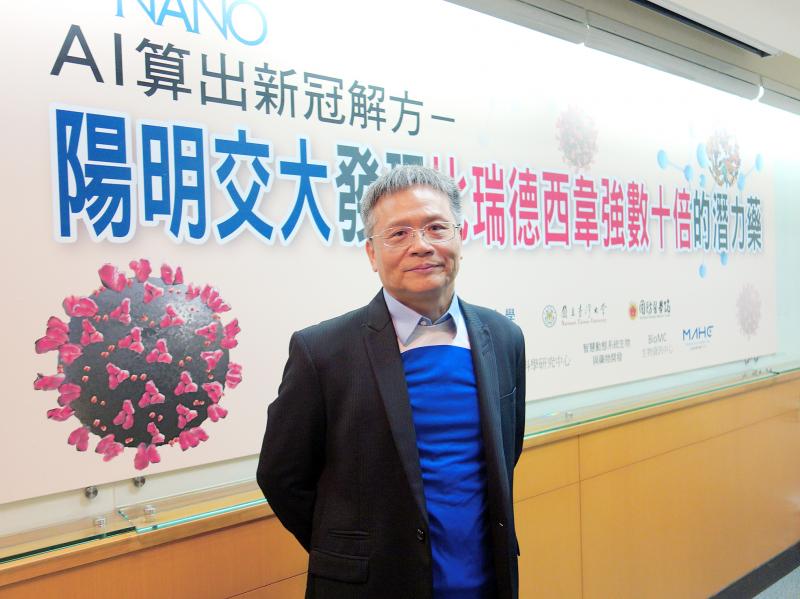National Yang Ming Chiao Tung University researchers have identified four antiviral drug candidates that can inhibit SARS-CoV-2, which causes COVID-19, the team leader said on Tuesday.
One of the drug candidates — JMY206 — is more than 10 times stronger than remdesivir, the first antiviral drug fully certified for the treatment of COVID-19, said Yang Jinn-moon (楊進木), dean of the university’s College of Biological Science and Technology.
The other drugs identified are boceprevir, an oral, direct-acting hepatitis C virus protease inhibitor; telaprevir, a hepatitis C drug; and nelfinavir, an antiretroviral drug used to treat HIV-positive patients, Yang said.

Photo: Wu Po-hsuan, Taipei Times
The team’s starting point was its understanding that SARS-CoV-2 is highly similar to the virus that causes SARS, Yang said.
It then gathered SARS-related data and screened US Food and Drug Administration-approved drugs and natural products for possible COVID-19 treatment, he said.
By using artificial intelligence and big data, the team created simulations of changes in cell mechanisms after SARS-CoV-2 entered human host cells, and compared them with 250 globally published images of the 3D architecture of the main protease of the virus.
That resulted in the identification of six possible structures of key proteases — the enzymes that break down proteins and could lead to disease — that are essential for promoting SARS-CoV-2 entry, Yang said.
The team then identified the drugs that could inhibit the proteases and eventually SARS-CoV-2.
The most potent of the drugs, JMY206, can inhibit SARS-CoV-2 from entering cells, the team said.
The therapeutic benefits of JMY206 have also been proven in animal experiments and it can be a potential oral drug against COVID-19, Yang said.
The team has applied for a patent, and is planning to publish a paper on its findings and develop medicines by combining other medicinal components, Yang added.

Taiwan has received more than US$70 million in royalties as of the end of last year from developing the F-16V jet as countries worldwide purchase or upgrade to this popular model, government and military officials said on Saturday. Taiwan funded the development of the F-16V jet and ended up the sole investor as other countries withdrew from the program. Now the F-16V is increasingly popular and countries must pay Taiwan a percentage in royalties when they purchase new F-16V aircraft or upgrade older F-16 models. The next five years are expected to be the peak for these royalties, with Taiwan potentially earning

STAY IN YOUR LANE: As the US and Israel attack Iran, the ministry has warned China not to overstep by including Taiwanese citizens in its evacuation orders The Ministry of Foreign Affairs (MOFA) yesterday rebuked a statement by China’s embassy in Israel that it would evacuate Taiwanese holders of Chinese travel documents from Israel amid the latter’s escalating conflict with Iran. Tensions have risen across the Middle East in the wake of US and Israeli airstrikes on Iran beginning Saturday. China subsequently issued an evacuation notice for its citizens. In a news release, the Chinese embassy in Israel said holders of “Taiwan compatriot permits (台胞證)” issued to Taiwanese nationals by Chinese authorities for travel to China — could register for evacuation to Egypt. In Taipei, the ministry yesterday said Taiwan

‘LIKE-MINDED PARTNER’: Tako van Popta said it would be inappropriate to delay signing the deal with Taiwan because of China, adding he would promote the issue Canadian senators have stressed Taiwan’s importance for international trade and expressed enthusiasm for ensuring the Taiwan-Canada trade cooperation framework agreement is implemented this year. Representative to Canada Harry Tseng (曾厚仁) in an interview with the Central News Agency (CNA) said he was increasingly uneasy about Ottawa’s delays in signing the agreement, especially as Ottawa has warmed toward Beijing. There are “no negotiations left. Not only [is it] initialed, we have three versions of the text ready: English, French and Mandarin,” Tseng said. “That tells you how close we are to the final signature.” Tseng said that he hoped Canadian Prime Minister Mark Carney

POSITIVE DEVELOPMENT: Japan and the US are expected to hold in-depth discussions on Taiwan-related issues during the meeting next month, Japanese sources said The holding of a Japan-US leaders’ meeting ahead of US President Donald Trump’s visit to China is positive news for Taiwan, former Japan-Taiwan Exchange Association representative Hiroyasu Izumi said yesterday. After the Liberal Democratic Party’s landslide victory in Japan’s House of Representatives election, Japanese Prime Minister Sanae Takaichi is scheduled to visit the US next month, where she is to meet with Trump ahead of the US president’s planned visit to China from March 31 to April 2 for a meeting with Chinese President Xi Jinping (習近平). Japan and the US are expected to hold in-depth discussions on Taiwan-related issues during the